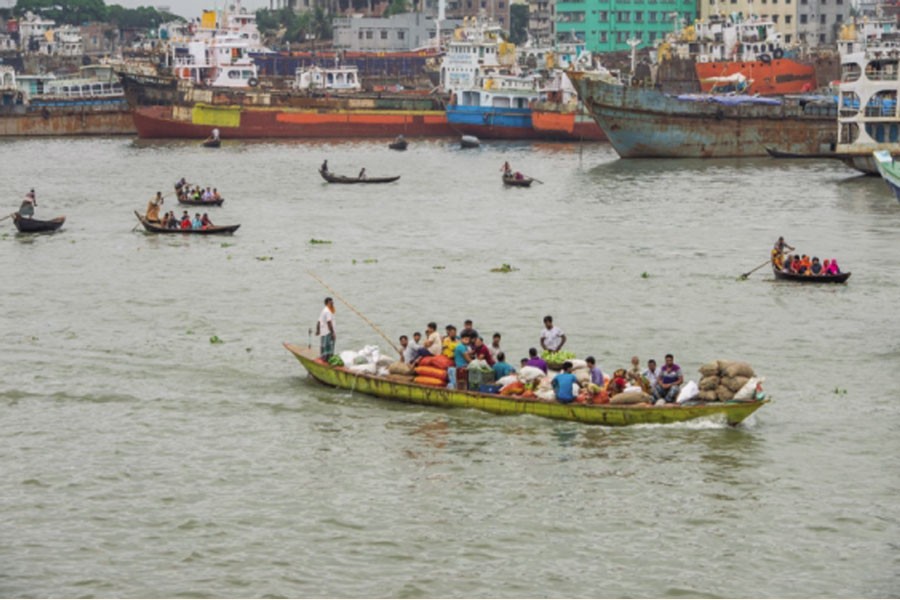
Published :
Updated :

Bangladesh features the world's largest river delta, formed by the junction of three great rivers - the Ganges, the Brahmaputra, and the Meghna. Two out of every three Bangladeshis - about 110 million people - live within this delta and depend on it for their lives and livelihoods.
As the threat of climate change and rising sea levels looms large, proper planning and management of the delta is critical to the country's economic growth and development.
BANGLADESH DELTA PLAN 2100: The Government of Bangladesh has formulated a comprehensive development plan - the Bangladesh Delta Plan (BDP 2100), focusing on economic growth, environmental conservation, and enhanced climate resilience. The plan lays out holistic and cross-sectoral action needed to improve productivity and minimize disaster risks.
Coupled with increasing climate risks, a business-as-usual scenario, without the implementation of the plan, would lead to declining agricultural production, increased unemployment, and migration. This would put additional pressure on urbanization resulting in an estimated decline in Gross Domestic Product (GDP) growth to 6.8 per cent by 2031 and 5.6 per cent by 2041. This would mean an additional 25.1 million people living in moderate poverty and 5.4 million in extreme poverty by 2041.
Effective implementation of the Delta Plan will eliminate extreme poverty, create more jobs and sustain GDP growth above 8 per cent until 2041. It will increase trade and navigational opportunities and strengthen food security. The Delta Plan will also help reduce urban migration by about 60 per cent, coastal zone out-migration by 50 per cent, and river area out-migration by 50 per cent.
IMPLEMENTING CHANGE: Delivering the BDP 2100 will require a combination of public and private funding from various sources. The current investment plan to support the implementation of BDP until 2030 is estimated to be $38 billion consisting of 65 infrastructure projects and 15 institutional, and knowledge development projects.
The World Bank has already invested $1.8 billion to enhance the supply of safe pipe water; improve sanitation, drainage infrastructure, and embankment system; increase areas protected by polders from tidal flooding and storm surge. It will also improve the navigability of 900 km of inland waterways to reduce travel time and transport costs - both for cargo and passengers - thereby boosting national and regional trade.
The Bank is also preparing several upcoming projects to further support the implementation of BDP 2100. These projects will help improve the navigability and river management infrastructure of Jamuna river to support inland water transport and boost economic activities around the river, as well as restore the ecology and transport capacity of the rivers of Dhaka City. The Bank will also work with the government to focus on reducing pollution while enhancing climate resilience and productivity of irrigated agriculture. The Climate Smart Agriculture and Water Management Project will rehabilitate water control infrastructures, drainage and irrigation sub-projects, making an area of 125,000ha climate resilient.
A series of institutional and policy reforms are underway to support the implementation of BDP 2100. A Delta Governance Council and an inter-ministerial forum headed by the Prime Minister of Bangladesh have already been established to provide strategic direction.
Through the strong commitment placed on BDP 2100, Bangladesh is on its way to become a global centre of excellence on delta and water management. This will take a comprehensive, integrated, and multisectoral, approach to water, land and related resource management that is sustainable. The investments to implement BDP will be based on Adaptive Delta Management approach to ensure that the right investments are made at the right time while working in harmony with the natural hydrological systems.
CONVENING WITH PARTNERS: Effective coordination and collaboration among multiple stakeholders will be key to achieving the vision of BDP 2100. The Bank has been convening the Bangladesh Water Platform, with support from the Global Water Security and Sanitation Partnership, to coordinate and facilitate collaborative efforts among partners. Through this platform, it will also support policy reforms, institutional arrangements, and capacity building to cross-sectoral government ministries.
Implementing the BDP 2100 goals will require a sustained and long-term effort. This includes managing investments; aligning the planning, implementation and financing process; improving inter-agency and inter-sectoral coordination; and designing adequate financing modalities for public-private partnership. The Bank remains committed to support the government on its journey towards a more safe, climate resilient and prosperous Bangladesh delta.
John Roome is Regional Director, South Asia Sustainable Development, World Bank.
The piece is excerpted from the World Bank Blogs


 For all latest news, follow The Financial Express Google News channel.
For all latest news, follow The Financial Express Google News channel.